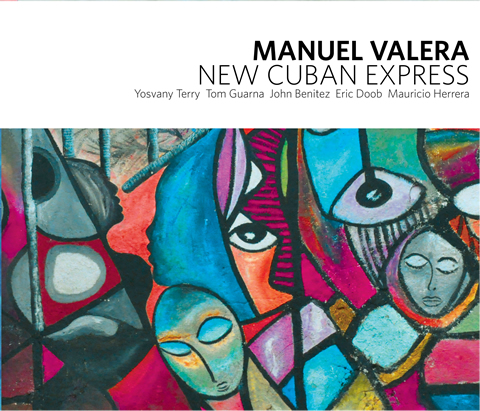New Stuff[hide]
Reportes: From The St... : Cubadisco 2...
Tienda: Cuban Music Store
Reportes: From The St... : Cubadisco 2...
Fotos: Tom Ehrlich
Staff: Kristina Lim
Musicos: Juan Formell
Musicos: Yordamis Megret Planes
Musicos: Yasser Morejón Pino
Musicos: José Luis "Changuito" Quintana...
Musicos: Dennis Nicles Cobas
Fotos: Eli Silva
Grupos: Ritmo Oriental : 1988 - Vol. IX - 30 a...
Musicos: Rafael Paseiro Monzón
Musicos: Jiovanni Cofiño Sánchez
Photos of the Day [hide]
New Cuban Express - (Mavo Records) Released 2012
CD Review: New Cuban Express by Manuel Valera (Mavo Records 2012)
Review by Bill Tilford, all rights reserved

I have waited for a few decades for this recording. Back when GES, Emiliano Salvador, Afrocuba, Irakere and a select few similar groups were the state of the art, I heard things in all of these ensembles that blew me away even then, but it was also clear that there was still plenty of room for the music to grow and evolve. Some of the musicians from that period, such as Arturo Sandoval, have been focusing more intensively (and with great success) on straight ahead jazz; others, such as Ernán López-Nussa and Maraca, have been incorporating more classical influences into their work, and still others are using various other methods to help move the music forward. Recently, artists such as Gonzalo Rubalcalba, Yosvany Terry, Alain Pérez and César López are some examples of the front-line artists taking Cuban Jazz in new directions, and Manuel Valera is an important, if underexposed, member of that select group. New Cuban Express is Manuel's sixth recording under his own name (he also appears on several other recordings with other artists) and his best work to date in my opinion, although his earlier recordings are also highly recommended.
It isn't as easy as you might think to seamlessly blend bop, post-bop, funk and Afrocuban into a final mixture that still grooves without losing either its melodic complexity or its sense of swing (countless bands have tried and many only got part way there), but Manuel's group pulls it off here and makes it all sound effortless even as it is blowing you away. John, Eric and Mauricio form a killer rhythm section that any first-tier funk band would die for, and they blend this with Afrocuban and straight-ahead passages flawlessly. Irakere was trying for this effect years ago with pieces like Chekere Son and Moja el Pan, and we still enjoy those songs a lot, but the opening track New Cuban Express is miles ahead of that earlier work both melodically and in terms of its funk quotient. Likewise, Chick Corea wove some funk into what he was doing, but once again, Manuel's group surpasses Chick's work there The Funk also comes charging out with Regards, which will get you moving somehow even if it just means wiggling in your chair.
Intro to Gismonteando / Gismonteando opens as Afrocuban/Rumba but then evolves into a Samba Jazz pattern that evokes some of Brasilian artist Egberto Gismonti's work (the guitarist, Tom Guarna, gets to stretch out on this piece). Choices also has some mixed Brasilian and Cuban undertones. It isn't all fireworks though - Me Faltabas Tú is rendered as a beautiful ballad, and Cinco Contra Tres is, as the title implies, an interesting overlay between three and five beats. Manuel turns in some beautiful piano solo passages in Intro to Upwards, which then explodes with the full ensemble in Upwards. Danzón, which opens with an extended quote from Lerner and Loewe's I Could Have Danced All Night, is stately piece until busting loose in the final movement. In some ways, the execution of this track evokes the late Emiliano Salvador's spirit even more than his composition Poly, which is also in the recording.
Yosvany Terry's reed and chekere work is, as usual, wonderful.
There are 13 tracks total in the recording, and all but two (Emiliano Salvador's Poly and Jose Antonio Mendez' Me Faltabas Tú) are originals.
Back when Jazz was first invented, the music was considered by some to be wild and dissonant, but many people danced to it even then. It was during Bebop's childhood that people began considering Jazz to be more of a "sit and listen" idiom. There is plenty for musicians to listen to (and sometimes learn from) in New Cuban Express, but I also suspect that some people will find a way to dance to some of this even though it isn't the conventional dance rhythms just as they did with early Jazz once upon a time.
Along with Yosvany Terry's (note that Yosvany appears here as well) Today's Opinion, New Cuban Express is one of the two best new Latin Jazz releases we've heard this year (or in a while, frankly), and sets a bar that will be hard for others to jump over.
But you really don't need to take my word for it - there is a live NPR concert available for listening on the web:
It won't take you more than a few seconds to figure out that you'll want this recording, and his earlier work is worth checking out as well.
One last word- there is a lot of debate within the Jazz community nowadays about whether there is some sort of crisis involving the emotion being sucked out of the music. I would present New Cuban Express as Exhibit A to prove that there are still groups recording today that absolutely do not have that problem.
2013 UPDATE: Since this review was written, New Cuban Express was nominated for a GRAMMY in the Best Latin Jazz Album category.
Manuel's website is http://www.manuelvalera.com/
PERSONNEL
| Role - Instrument | Name |
|---|---|
| Producer, Leader, Piano, Fender Rhodes and Keyboards | Manuel Valera |
| Saxophones and Chekere | Yosvany Terry |
| Electric and Acoustic Guitar | Tom Guarna |
| Bass | John Benitez |
| Drums | Eric Doob |
| Percussion | Mauricio Herrera |















